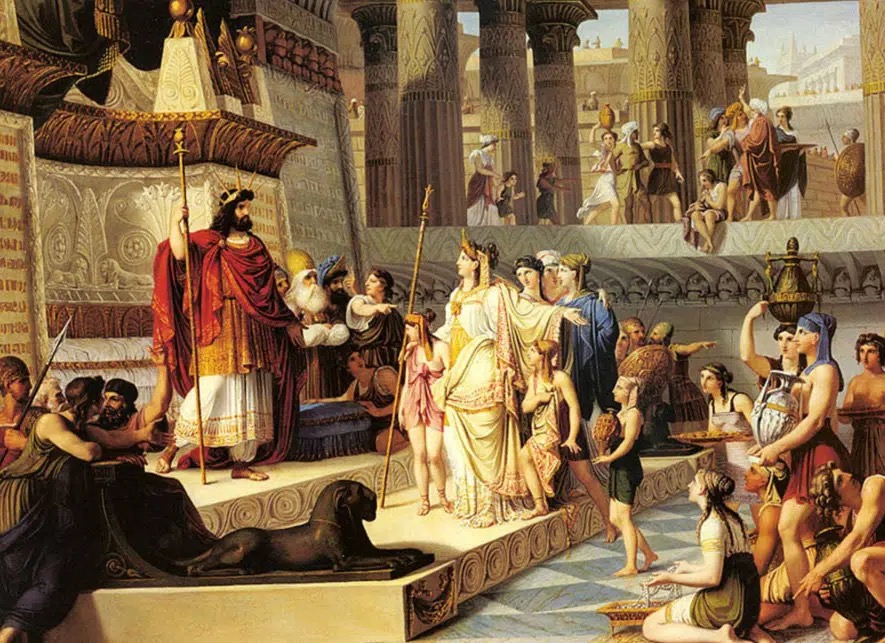In the rich tapestry of biblical accounts, King Solomon emerges as an exemplar of wisdom and governance. Being the progeny of King David, his path to monarchy is steeped in divine intervention and remarkable precocity. In this exploration, we delve into the age of Solomon at the time of his coronation, shedding light on the importance of his early rise to power and its lasting influence on the history of ancient Israel.
The Enigma of Solomon’s Age
Unraveling the precise age of Solomon when he ascended the throne necessitates a deep dive into biblical chronicles, which are for the most part, enigmatic. While the scriptures do not explicitly state his age at the time of his inauguration, through careful examination and interpretation of the text, scholars have postulated various theories.
- Some believe he was around 12 to 16 years old considering the biblical reference to his youth and inexperience;
- Others conjecture his age to be 20, basing their speculation on the Jewish tradition of considering a boy as an adult at this age;
- A more conservative estimate places Solomon in his early twenties or perhaps even later, taking into account the responsibilities and demands of a monarch.
While the truth remains elusive, these theories reflect the wide spectrum of interpretations that exist.
Solomon’s Early Ascension: Significance and Impact
Looking beyond the mystery of his age, Solomon’s early ascension holds significant implications. The divine mandate is not dependent on age, and this is exemplified in Solomon’s story. His wisdom, an endowment from God, enabled him to rule judiciously and construct the iconic Temple of Jerusalem which became a symbol of national unity.
Solomon’s reign marked a golden era for Israel – a period of peace, prosperity and significant architectural achievements. Despite his youth, he effectively navigated the complexities of leadership, demonstrating a maturity beyond his years.
Moreover, Solomon’s early ascension to the throne served as an invaluable lesson in leadership, emphasizing the importance of wisdom and divine guidance over physical age or strength. It’s a potent reminder that effective leadership transcends age and is anchored in wisdom, understanding, and the ability to inspire unity.
The Ascension of Solomon: A Story of Providence and Wisdom
Upon King David’s demise, the succession to the throne was fraught with uncertainty. Adonijah, the eldest surviving son, attempted to usurp power. However, the discerning intervention of Prophet Nathan and Bathsheba orchestrated a different sequence of events. As narrated in 1 Kings 1:32-40, Solomon, still a young man, was anointed as king during King David’s lifetime. This decisive move ensured tranquillity during the transition of power and marked the commencement of a new era under Solomon’s rule.
The Youthful Monarch: Solomon’s Age at Ascension
The Biblical texts remain silent on the exact age of Solomon at his coronation, leaving it a subject of conjecture among scholars and historians. Digging into historical analyses and scholarly suppositions, it is generally believed that Solomon ascended the throne somewhere in his early twenties, with estimates ranging from 20 to 22 years old.
Though young in years, Solomon’s rule would demonstrate a maturity and wisdom that far surpassed his age. His ascension as a young king serves as a shining example of how divine wisdom and guidance can trump youth and inexperience.
A Legacy Beyond Age: The Lasting Impact of Solomon’s Reign
From his unexpected crowning to his successful rule, Solomon’s story is a testament to the power of divine wisdom and providence. Despite the uncertainty surrounding his exact age at the moment of ascension, Solomon’s reign produced an enduring legacy that transcended mere chronology. His reign was marked by:
- Monumental architectural endeavors such as the construction of the First Temple in Jerusalem;
- The expansion of Israel’s territory to its greatest extent;
- The establishment of a prosperous and peaceful kingdom.
Moreover, Solomon’s fame for his wisdom attracted attention far beyond Israel’s borders, including the celebrated visit of the Queen of Sheba. His proverbs and songs have been preserved in the Biblical books of Proverbs, Ecclesiastes, and Song of Solomon, further contributing to his enduring legacy.
Proverbs and Parables: The Saga of Solomon’s Wisdom
One of the most striking attributes of Solomon’s reign was his extraordinary wisdom. He was renowned for his judicious decision-making ability and his sharp discernment, which helped him navigate the intricate affairs of governance with ease. Several anecdotes highlight his unparalleled wisdom, with the dispute between two women over a baby (1 Kings 3:16-28) standing as a classic example.
The Test of Wisdom: Solomon and the Maternal Dispute
In this renowned incident, two women came to Solomon with a starkly complicated conundrum. Both claimed to be the real mother of the same infant. Faced with this challenging dilemma, Solomon made a startling decision. He suggested to split the baby into two halves and give each woman one half. His surprising verdict shocked everyone present. However, this was an ingenious test. Realizing that the genuine mother would rather surrender her right than see her child harmed, Solomon keenly observed the women’s reactions.
When one woman readily agreed to Solomon’s drastic proposal, whereas the other begged him not to harm the child, Solomon’s wisdom shone through. His astute observation and understanding of human nature allowed him to identify the real mother, who was willing to give up her claim to save her child’s life. Thus, Solomon’s ruling was not only fair but uniquely insightful, revealing his God-given wisdom and aptitude for just governance.
The Impact of Solomon’s Wisdom: A Reign Marked by Progress
Solomon’s wisdom wasn’t limited to solving disputes. His knowledge and discernment fueled his reign, driving progress and prosperity within his kingdom. His understanding of diplomacy led to peaceful relations with neighboring nations, and his architectural vision drove the construction of the First Temple, an extraordinary achievement that stood as a symbol of national unity and religious devotion.
Additionally, Solomon’s wisdom was immortalized in the biblical books of Proverbs, Ecclesiastes, and Song of Solomon. His wise sayings continue to guide and inspire people to this day, further underscoring his enduring influence.

Solomon’s Reign: A Time of Monumental Construction and Expansion
Beyond the captivating story of his ascension and remarkable wisdom, King Solomon is also remembered for his significant contributions to nation-building and expansion of the kingdom. His rule marked a golden era of architectural marvels and political growth, the echoes of which can still be heard in the annals of history.
The First Temple: The Crowning Jewel of King Solomon’s Reign
One of Solomon’s most monumental feats was the construction of the First Temple in Jerusalem. This grand sanctuary, also known as Solomon’s Temple, was considered a divine masterpiece. It became the central place of worship for the Israelites, housing the Ark of the Covenant.
The splendor of the temple showcased the remarkable prosperity of the kingdom under Solomon’s rule. The elaborate artistry, the intricate carvings, and the lavish use of precious metals made the temple an architectural marvel of the time. Its construction not only amplified the national pride of the Israelites but also pointed to Solomon’s devotion and obedience to God’s directives.
Reign of Expansion: King Solomon’s Diplomatic Prowess
Solomon’s reign wasn’t only about architectural achievements; he also significantly extended Israel’s territorial reach. Solomon masterfully orchestrated strategic alliances, sealed trade agreements, and established an extensive administrative network, effectively expanding and consolidating the kingdom’s influence.
His diplomacy skills were legendary. Through forging alliances, notably with the Pharaoh of Egypt and King Hiram of Tyre, Solomon ensured peace with neighboring kingdoms. These alliances not only stabilized Israel’s geopolitical standing but also opened avenues for trade and cultural exchange.
Under Solomon’s wise leadership, Israel experienced remarkable growth, moving from a relatively small kingdom to a significant regional power.
The Enigma Continues: Authorship of the Book of Revelation
As we journey through the multifaceted tapestry of biblical mysteries, it is only fitting to briefly touch upon another enigmatic facet: the authorship of the Book of Revelation. Much like the age of King Solomon at his ascension, the identity of the author behind this apocalyptic text remains a subject of debate and intrigue among scholars and theologians.
Traditionally attributed to John the Apostle, the Book of Revelation stands as a prophetic and allegorical work that offers profound insights into the eschatological narrative. Its vivid imagery and cryptic symbolism have captivated readers and scholars for centuries, while its authorship has remained a matter of speculation.
Some contend that John the Apostle, the beloved disciple of Jesus, penned this visionary tome during his exile on the island of Patmos. Others propose the existence of a different John, known as John of Patmos, as the author. The ambiguity surrounding the author’s identity adds yet another layer of complexity to the intricate web of biblical mysteries.
Concluding Insights
King Solomon’s reign encapsulates a pivotal chapter in biblical history characterized by wisdom, architectural grandeur, and diplomatic expansion. Despite the controversies around his ascension and the uncertainty about his age when he took on the mantle of leadership, his reign marked an era of peace, prosperity, and progress.
The construction of the First Temple and the expansion of the kingdom stand as twin pillars of Solomon’s successful rule. His leadership encapsulates the ethos of wisdom, tactical acumen, and unswerving devotion to God.
The story of Solomon’s reign underscores the essence of effective leadership – wisdom and the courage to take bold strides towards progress. It serves as a timeless template for leaders from all ages, reminding them that with wisdom, judicious decision-making, and strategic alliances, one can steer their realm towards unparalleled growth and prosperity.


No Responses